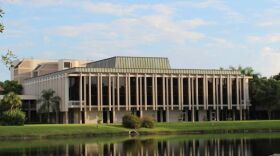JUANA SUMMERS, HOST:
We begin today at the White House, where President Biden welcomed India's Prime Minister Narendra Modi to Washington with great fanfare. An estimated crowd of 7,000 people gathered on the South Lawn to join in that welcome. The sheer size of that crowd is proof of the partnership between India and the United States. But this partnership comes with questions about Biden's foreign policy vision. NPR White House correspondent Asma Khalid joins us now. Hey there.
ASMA KHALID, BYLINE: Hi there - good to be with you.
SUMMERS: So, Asma, what is this visit about?
KHALID: Well, fundamentally, it's about China. This White House is deeply concerned about China's aggression and influence in the Indo-Pacific, and India is also very nervous about its neighbor. Akriti Vasudeva Kalyankar is with the Stimson Center. That's a think tank that focuses on security issues.
AKRITI VASUDEVA KALYANKAR: The China factor is really an accelerant in the relationship. It has really, you know, moved forward cooperation in many ways, particularly on the defense and security side, but I don't think the U.S.-India relationship is just about China.
KHALID: And that's what both leaders today suggested. They spoke about collaborating on a long list, including semiconductors and space. But experts say India's geography is a big part of this friendship because if India did not border China, would the U.S. really be willing to overlook some of these differences?
SUMMERS: And, Asma, what are those differences?
KHALID: Well, one is Russia. India has not been willing to outright condemn Russia for its invasion of Ukraine. And it continues to buy a lot of oil from Russia, which has helped financially fuel the war. Biden said today they did talk about ways to mitigate the humanitarian tragedy of the war, and Modi reiterated that his country has put an emphasis on finding a resolution to the conflict. But there were no indications that he's changing any of his positions. Another big issue is human rights. Biden, you know, campaigned on a pledge to center human rights in his foreign policy. Modi's government has been widely criticized for stifling dissent, for discriminating against religious minorities and for cracking down on a free press.
SUMMERS: And today, did Biden press Modi on human rights?
KHALID: Well, Biden said he had a good discussion with Modi about democratic values, and he suggested that these values are what ought to tie India and the U.S. together.
(SOUNDBITE OF ARCHIVED RECORDING)
PRESIDENT JOE BIDEN: I look forward to discussing how we can strengthen our partnership and build a future together worthy of both our peoples - one grounded on democracy, human rights, freedom and rule of law.
KHALID: And, you know, Juana, I will say there was a press conference today, and I think that in itself is noteworthy because Modi doesn't really do press conferences in India. He was asked today by an American journalist what steps he's willing to take to improve the rights of minorities and uphold free speech. And he denied that, frankly, there is a problem. Here he is speaking through an interpreter.
(SOUNDBITE OF ARCHIVED RECORDING)
PRIME MINISTER NARENDRA MODI: (Through interpreter) We have always proved that democracy can deliver. And when I say deliver, this is regardless of caste, creed, religion, gender. There's absolutely no space for discrimination.
SUMMERS: OK. And, Asma, before we wrap, I want to go back to China for a second. Is the U.S. willing to look past some of these issues because it's playing a long game with India?
KHALID: Some experts would say yes. You know, India is the most populous country in the world, and Biden himself has described the U.S.-India relationship as being the defining partnership of this century. He also said today that fundamentally, both India and the U.S. have democracy in their DNA, and so even if there are concerns about democratic backsliding, it is still a very different relationship that the U.S. has with India than with China, a country whose leader Biden recently described as being a dictator.
SUMMERS: NPR's Asma Khalid. Thank you.
KHALID: My pleasure. Transcript provided by NPR, Copyright NPR.









